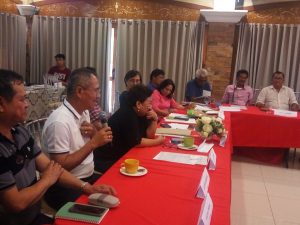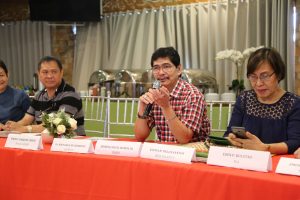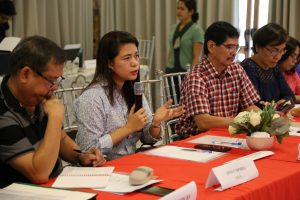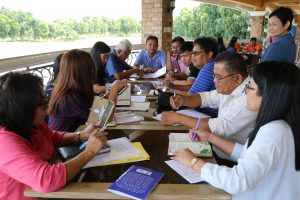NAGA CITY, CAMARINES SUR – “Please help us preserve and conserve the remaining prime agricultural area for food security. How can we attain food security when our prime agricultural lands cannot be used anymore?” This was the challenge given by Bureau of Soils and Water Management (BSWM) Director and National Technical Committee on Land Use Matters (NTECLUM) Chairperson Angel C. Enriquez to Regional Technical Committee on Land Use Matters (RTECLUM) members present during the Consultation Workshop of the Project Strengthening and Mainstreaming Evaluation Mechanism on Land Use Reclassification (SEMLUR) held on September 26-28, 2018, this city.
Thirty-six RTECLUM and NTECLUM members and secretariat from CALABARZON, MIMAROPA, and Bicol attended the activity. SEMLUR is a three-year project worth P10.850 million spearheaded by the BSWM Agricultural Land Management and Evaluation Division (ALMED) that aims to develop a national protocol, enhance and mainstream the technical evaluation aspect and fast track the process of issuance of land use reclassification.
According to BSWM Soils Survey Division Chief Dominciano D. Ramos Jr., the activity is the first of a series of consultation workshops to be conducted nationwide to finalize the guidelines for the issuance of certificate of land use reclassification.
“Land use reclassification and land conversion is a sensitive issue… Lumiliit na nang lumiliit ang ating production area and wala tayong kasiguraduhan kung yan ba ay hihinto o hindi,” he said.
Dr. Mary Grace DP. Rodriguez, OIC Chief of the Department of Agriculture (DA)- Bicol Field Operations Division, underscored the essence of balanced actions toward sustainable development.
“Our population increases exponentially but our food increases geometrically. Hindi sya nakasabay sa pag-increase ng population considering na ang land natin hindi naman nag-i-increase. The challenge is lumiliit pa ang agricultural areas natin because of the applications on reclassification, nako-convert sya… Yung ating actions toward sustainable development should always be economically feasible but also socially acceptable and environmentally viable,” she said.
She also highlighted the importance of food self-sufficiency.
“Hindi tayo pwedeng lahat i-iimport. Kailangan we produce our own food. If we import a bulk of our supply from the outside, what if sila naman ang magkaroon ng disaster? O baka masyado tayong masakal na sa kanila. We really need to produce our own food,” she added.
Both agreed that having clear guidelines and process on land use reclassification will safeguard the Department from external pressures causing land conversion disputes.
Meanwhile, Enriquez encouraged the RTECLUM and NTECLUM members to exercise due diligence in reviewing and issuing certificates of land use reclassification, which is a requirement for land conversion. She also announced that the Bureau is currently updating the Network of Protected Areas for Agricultural and Agro-industrial Development (NPAAD) and Strategic Agriculture and Fisheries Development Zones (SAFDZ). She mentioned that based on initial updated data, most areas planted to rice are now owned by developers. She warned that if this activity will not be discouraged, the country’s food security will be compromised.
DA-Bicol Regional Technical Director for Research and Regulations Dr. Edgar R. Madrid noted that the control mechanism on land use reclassification lies on how the national government could further implement guidelines and laws in order to secure land than to sacrifice its interest towards food security.
“We want to safeguard agricultural lands because most of the areas reclassified are prime agricultural lands,” he added.
Among the topics covered by the consultation-workshop are the issues and concerns as well as proposed refinements in the implementation of DA Administrative Order 01 series of 2017 or the Guidelines on the Issuance of Certification for Land Use Reclassification. BSWM also conducted a discussion on Memorandum Circular (MC) 54 of 1993 and joint MC of the Housing and Land Use Regulatory Board (HLURB), DA, Department of Agrarian Reform (DAR) and Department of Interior and Local Government (DILG) of 1995. The Bureau also consolidated suggestions on management of information on applications for land use reclassification.
Ramos and Enriquez turned over an Atlas of Soil-Based Agricultural Guide Maps of Luzon Island to DA RFO V through Dr. Madrid. The atlas is an output of the BSWM National Soil Sampling and Testing for Rice Project Phase I and II which contains fertility map, fertilizer recommendation, soil pH and status of nitrogen (N), phosphorus (P) and potassium (K) (NPK) and rice suitability.
The RTECLUM is an inter-agency committee that receives, reviews and ensures the completeness of documentary requirements on land use reclassification application. Composed of the DA Regional Executive Director as Chairperson and technical staff from the National Irrigation Administration (NIA), Philippine Coconut Authority (PCA) and Sugar Regulatory Administration (SRA), the RTECLUM conducts field investigations and convene as a Committee to process, evaluate and provide initial recommendation as to eligibility or non-eligibility for land use reclassification.
The NTECLUM, on the other hand, is chaired by the BSWM director with the NIA Operations Manager as Vice Chairperson and technical staff from NIA, PCA, SRA, BSWM, DA Field Operations Service, Office of the Secretary, DA Legal Service and principal and alternate representative. It evaluates and recommends eligibility and non-eligibility for reclassification of agricultural lands for the Secretary’s approval. (Annielyn L. Baleza, DA-RAFIS V)




